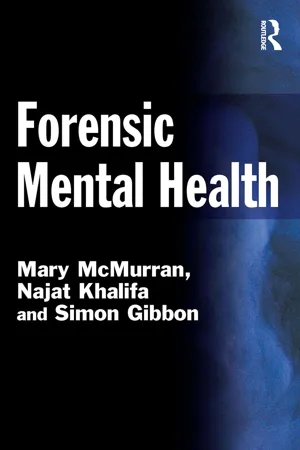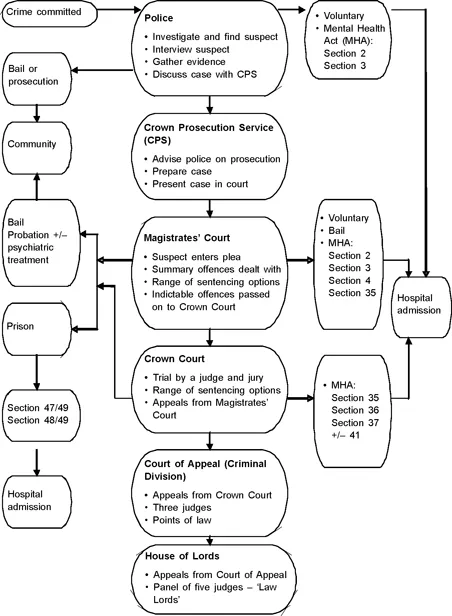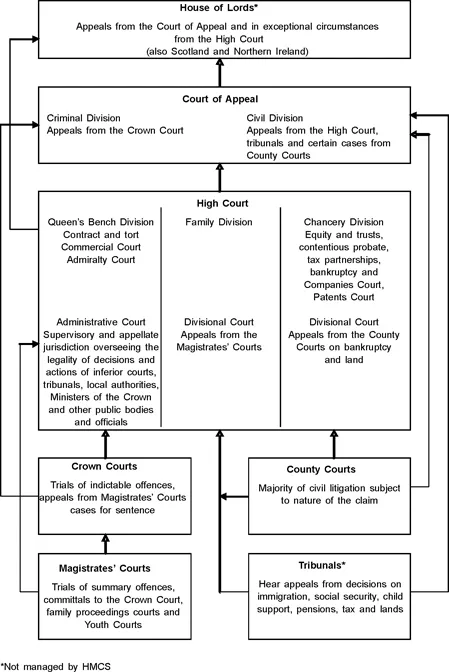
- 240 pages
- English
- ePUB (mobile friendly)
- Available on iOS & Android
eBook - ePub
Forensic Mental Health
About this book
This book provides a concise introduction to the increasingly important field of forensic mental health. It aims to set out both the key concepts in forensic mental health as well as the way the discipline operates in the broader context of criminal justice and mental health care systems. It will provide an ideal introduction to the subject for students taking courses in universities and elsewhere, for mental health practitioners in the early stages of their careers, and for professionals from other agencies needing an informed and up-to-date account of forensic mental health.
Frequently asked questions
Yes, you can cancel anytime from the Subscription tab in your account settings on the Perlego website. Your subscription will stay active until the end of your current billing period. Learn how to cancel your subscription.
No, books cannot be downloaded as external files, such as PDFs, for use outside of Perlego. However, you can download books within the Perlego app for offline reading on mobile or tablet. Learn more here.
Perlego offers two plans: Essential and Complete
- Essential is ideal for learners and professionals who enjoy exploring a wide range of subjects. Access the Essential Library with 800,000+ trusted titles and best-sellers across business, personal growth, and the humanities. Includes unlimited reading time and Standard Read Aloud voice.
- Complete: Perfect for advanced learners and researchers needing full, unrestricted access. Unlock 1.4M+ books across hundreds of subjects, including academic and specialized titles. The Complete Plan also includes advanced features like Premium Read Aloud and Research Assistant.
We are an online textbook subscription service, where you can get access to an entire online library for less than the price of a single book per month. With over 1 million books across 1000+ topics, we’ve got you covered! Learn more here.
Look out for the read-aloud symbol on your next book to see if you can listen to it. The read-aloud tool reads text aloud for you, highlighting the text as it is being read. You can pause it, speed it up and slow it down. Learn more here.
Yes! You can use the Perlego app on both iOS or Android devices to read anytime, anywhere — even offline. Perfect for commutes or when you’re on the go.
Please note we cannot support devices running on iOS 13 and Android 7 or earlier. Learn more about using the app.
Please note we cannot support devices running on iOS 13 and Android 7 or earlier. Learn more about using the app.
Yes, you can access Forensic Mental Health by Mary McMurran,Najat Khalifa,Simon Gibbon in PDF and/or ePUB format, as well as other popular books in Diritto & Scienza forense. We have over one million books available in our catalogue for you to explore.
Information
Topic
DirittoSubtopic
Scienza forenseChapter 1
Introduction: the criminal justice system and mental health legislation
The aim of this book
This book is intended for the newcomer to the topic of forensic mental health. This person might be a student of psychology, criminology, law or mental health on a formal educational course, or someone with no exam to pass but who seeks to know more about this particular aspect of the society in which he or she lives. Our aim is to give this newcomer a clear and succinct overview of the contexts in which forensic mental health professionals work and the kinds of services and treatments that they provide. The provision of forensic mental health services is intimately bound with the legal and criminal justice systems of the country in question. The focus in this book is on practice in England and Wales. Our starting point, therefore, is to describe both the criminal justice system and mental health legislation relating to England and Wales. This will provide a foundation for understanding how offenders enter probation and prison services, and how mentally disordered offenders come to be treated as inpatients or outpatients in forensic mental health services.
The criminal justice system
In England and Wales, the criminal justice process is delivered by a number of agencies that work collaboratively under the umbrella of the criminal justice system (often referred to by its initials — CJS). These include the police, the Crown Prosecution Service, Her Majesty's Court Service, the National Offender Management Service (which incorporates the prison and probation services), the Youth Justice Board (a body that works with young people and communities to prevent offending and reoffending) and the Serious Fraud Office. The work of these agencies is overseen by the Ministry of Justice, the Home Office and the Attorney General's Office (see Information Box 1.1). The overall aims of the criminal justice system are: (1) to detect and prevent crime; (2) to rehabilitate and punish offenders; and (3) to support victims and witnesses of crime.
The criminal justice process is depicted in Figure 1.1. Once a crime has been reported to the police, the important tasks then are to investigate, gather evidence and, crucially, find the culprit. Following arrest, the suspect is interviewed and forensic materials may be obtained from the suspect for analysis. The police may obtain further advice from the Crown Prosecution Service (another body often referred to by its initials — CPS) as to whether the suspect should be charged or not. This decision is based upon whether there is sufficient evidence to indicate that a conviction might be likely and also whether pursuing a conviction is in the public interest. Once the suspect is formally charged, the Crown Prosecution Service prepares a case and presents it at court. Most major cases of fraud are prosecuted by the Serious Fraud Office, which specialises in such crime.
Some minor offences can be dealt with by the police using the powers available to them, such as serving a reprimand or a caution;
Information Box 1.1 The government departments responsible for the criminal justice system
- The Ministry of Justice — responsible for criminal law and sentencing, reducing reoffending, and prisons and probation. The Ministry of Justice also oversees Magistrates' Courts, Crown Courts, the Appeals Courts and the Legal Services Commission.
- The Home Office — responsible for crime and crime reduction, policing, security and counter-terrorism, borders and immigration, passports and identity.
- The Office of the Attorney General — oversees the Crown Prosecution Service, the Serious Fraud Office and the Revenue and Customs Prosecutions Office.

Figure 1.1 The criminal justice process and diversion mechanisms
however, more serious offences are dealt with by the courts. Virtually all criminal cases start in the Magistrates' Court or the Youth Court which is a section of the Magistrates' Court dealing with most cases involving young people under the age of 18 (from the age of 10, which is the age of criminal responsibility in England and Wales). The majority of minor (summary) offences are dealt with in the Magistrates' Court, whereas serious (indictable) offences are passed on to the Crown Court for trial by a judge and jury. The courts have a range of sentencing options (disposals) available to them to deal with convicted offenders. Of course, the criminal justice process may not end here; an appeal against a conviction may be pursued provided there are sufficient grounds for making one.
The police
The overall responsibility for policing England and Wales lies with the Home Office. There are 43 police forces employing over 228,000 personnel (Home Office 2007). Each police force is comprised of a number of divisions, each of which is divided into local area commands (LACs). Police stations within the local area commands deliver policing to local neighbourhoods and estates. The work of each of the police forces is overseen by a local police authority, an independent body comprised of local councillors, magistrates and independent members of the public.
The police represent the point of entry to the criminal justice system. Crimes are reported to the police in the first instance and the role of the police is to investigate, gather evidence and find a suspect. Police interviews involving witnesses and crime suspects remain a crucial part of the evidence gathering process. Advances in technology have made it possible to utilise other materials, such as closed-circuit television (CCTV) footage and DNA (deoxyribonucleic acid) techniques. The Police and Criminal Evidence Act (PACE) 1984 and the PACE Codes of Practice provide the framework for the use of police powers and they provide procedures for stop and search, arrest, detention, investigation, identification and interviewing detainees (Home Office Police 2008). PACE also presents a number of safeguards for individuals with mental disorders and mental handicaps. These safeguards include the presence of an appropriate adult or a solicitor or both during police interviews. In addition, PACE allows judges to exclude unreliable confessional evidence from trials. Of particular relevance is the issue of fitness for interview in police custody, which will be addressed in Chapter 3.
Crown Prosecution Service
The Crown Prosecution Service (CPS) is the body that prosecutes criminal cases on behalf of the Crown. Its principal aim is to bring offenders to justice firmly, fairly and effectively. The Service is staffed largely by barristers and lawyers, and is headed by the Director of Public Prosecutions (DPP). The work of the Crown Prosecution Service is overseen by the Attorney General, who is the government Minister answerable for the Crown Prosecution Service in Parliament. In 2005, the Crown Prosecution Service was expanded to incorporate three new divisions which deal with organised crime, counter-terrorism and specialised crime.
The Crown Prosecution Service has 42 areas across England and Wales, divided into 15 regional groups, with each area headed by a Chief Crown Prosecutor. The Crown Prosecution Service works closely with the police to decide whether or not to charge a suspect. Such a decision is based on two tests: the evidential test and the public interest test. In other words, the public prosecutor has to be satisfied that there is enough reliable evidence against the suspect for a conviction to be possible, and that prosecution is in the public's best interest. Once these tests are satisfied, the suspect is formally charged and the Crown Prosecution Service will then have to prepare a case and present it in court. The aim is to prove beyond reasonable doubt that the defendant committed the act or made the omission of which they were accused.
Justice can only be served if victims and witnesses are prepared to testify in court. Therefore, the Crown Prosecution Service has developed a role in supporting witnesses and victims of crime throughout their potentially stressful court appearances. Witness care units (WCUs) allocate an officer to attend to every victim and witness, explaining what happens in court and helping them attend sessions. The Crown Prosecution Service may apply for special measures such as allowing the victim to be shielded from the defendant's view in the courtroom or to give evidence through a live television link, clearing the public gallery, or reducing the formality of the court by asking for wigs and gowns to be removed.
The Crown Prosecution Service may also seek opinion from an ‘expert witness’, that is a person who, by virtue of their training or experience, has specialised knowledge that may help the court interpret facts or evidence. Mental health professionals may be called for an expert opinion in relation to mental health matters, such as the defendant's fitness to plead or psychiatric defences such as insanity, diminished responsibility, automatism and insanity (refer to Chapter 3 for more details). The Crown Prosecution Service may also instruct an expert witness to respond to the views expressed by the defence's expert witness. For further information on the Crown Prosecution Service, see their website (http://www.cps.gov.uk).
The Court Service
Her Majesty's Courts Service (HMCS) is an executive agency of the Ministry of Justice and is responsible for managing the Magistrates' Courts, the Crown Court, County Courts, the High Court and Court of Appeal in England and Wales. The Court Service in England and Wales is depicted in Figure 1.2 and the types of courts are described below.
Magistrates' Court
Virtually all criminal cases start at the Magistrates' Court. In addition, a range of civil cases and cases which involve people under the age of 18 (only if they are tried with an adult) are dealt with in the Magistrates' Court. Cases which involve people aged between 10 and 17 are dealt with in the Youth Court — a specialised form of Magistrates' Court. Almost 95 per cent of less serious (summary) offences are dealt with at the level of the Magistrates' Courts, whereas more serious (indictable) offences are passed on to the Crown Court for trial by a judge and jury. The majority of the cases in the Magistrates' Court are heard by a ‘bench’ consisting of three magistrates (justices of the peace), who are supported by a legally qualified court clerk. Magistrates do not hold any formal legal qualifications, although they receive a significant amount of legal training. Their work is unpaid but they are reimbursed for expenses and loss of earnings. Within some of the Magistrates' Courts, district judges (who are legally qualified and paid) sit alone and deal with more complex matters, for instance, cases related to extradition and serious fraud. A range of sentencing options are available to the magistrates; in addition to community sentences, they can order terms of imprisonment of up to 6 months (or 12 months for consecutive sentences) or fines up to £5,000.
Crown Court
More serious (indictable) offences such as murder, manslaughter, rape and robbery are dealt with in the Crown Court. Appeals from the Magistrates' Court, sentencing decisions transferred from

Figure 1.2 The structure of court service in England and Wales (reproduced with permission from HMCS)
the Magistrates' Court and ‘either-way’ offences (i.e. cases that are triable either by the Magistrates' Court or the Crown Court) are also dealt with in the Crown Court. Crown Court trials are heard by a judge and jury of 12 persons — members of the public whose role it is to decide, based on the facts, whether a defendant is guilty or not guilty of an offence. When the jury returns a ‘not guilty’ verdict, the accused will be acquitted, but a ‘guilty’ verdict will result in a conviction and subsequent sentencing. A range of sentencing options are available to the trial judge, including imposing fines, prison sentences, community sentences (some of which have a condition of treatment) and hospital orders under the Mental Health Act (this is explained more fully later in this chapter).
The appeal process
Appeal against a conviction may be pursued at various stages of the criminal justice process, provided there is sufficient ground for making one (see Information Box 1.2). As mentioned earlier, appeals from the Magistrates' Court are heard at the Crown Court. Appeals from upper courts (i.e. all courts above Magistrates' Courts) are heard at the Court of Appeal, which is in two divisions: the Civil Division and the Criminal Division. The former hears appeals from the High Court, County Courts and certain tribunals, whereas the latter hears appeals from the Crown Court. The House of Lords is the highest appellate authority, i.e. the final court of appeal in the UK. It deals with appeals from the Court of Appeal and, in exceptional circumstances, from the High Court. In the House of Lords there are only 12 Lords of Appeal in Ordinary (‘Law Lords’), who usually sit in panels of five.
More information on the courts is available on Her Majesty's Court Service website (http://www.hmcourts-service.gov.uk).
The National Offender Management Service
The National Offender Management Service (NOMS) was established in 2004 to ‘bridge the divide between custody and community’ and incorporates both the prison and probation services. The National Offender Management Service is responsible for the system through which correctional services and interventions are commissioned and provided, and thus it helps to deliver punishments and also coordinates rehabilitative, health, educational and resettlement opportunities for offenders to help them reduce reoffending.
Information Box 1.2 Grounds for appeal
- Misdirection of law
- Non-direction on the law
- Failure to refer to a defence
- Misdirection on the facts
- Inappropriate comment by the judge
- Wrongful admission or exclusion of the evidence
- Defects in the indictment
- Rejection of no case to answer
- Jury irregularities
- Irregularity in relation to verdict
- Prosecution responsibilities such as non-disclosure or late change in nature of the case
- Important new evidence
The National Offender Management Service has introduced a new ‘Offender Management Model’, whereby an offender management team (made up of an offender manager, offender supervisor, key workers and case administrators) helps to design and support individual intervention programmes that will help the offender change his or her offending behaviour. The help of mental health professionals may also be sought, particularly in relation to the management of mental disorder and risk. Central to the work of the National Offender Management Service is ‘end-to-end offender management’ and the National Offender Management Information System (NOMIS) is an infor...
Table of contents
- Cover
- Half Title
- Criminal Justice Series
- Full Title
- Copyright
- Dedication
- Contents
- Foreword
- List of abbreviations
- About the authors
- 1 Introduction: the criminal justice system and mental health legislation
- 2 Mental disorder and offending
- 3 Entering the forensic mental health system
- 4 Forensic mental health services
- 5 The multidisciplinary team
- 6 Risk assessment
- 7 Treatments in prison and probation services
- 8 Treatments in mental health settings
- 9 Leaving the system, patients' rights and advocacy
- Afterword
- References
- Index